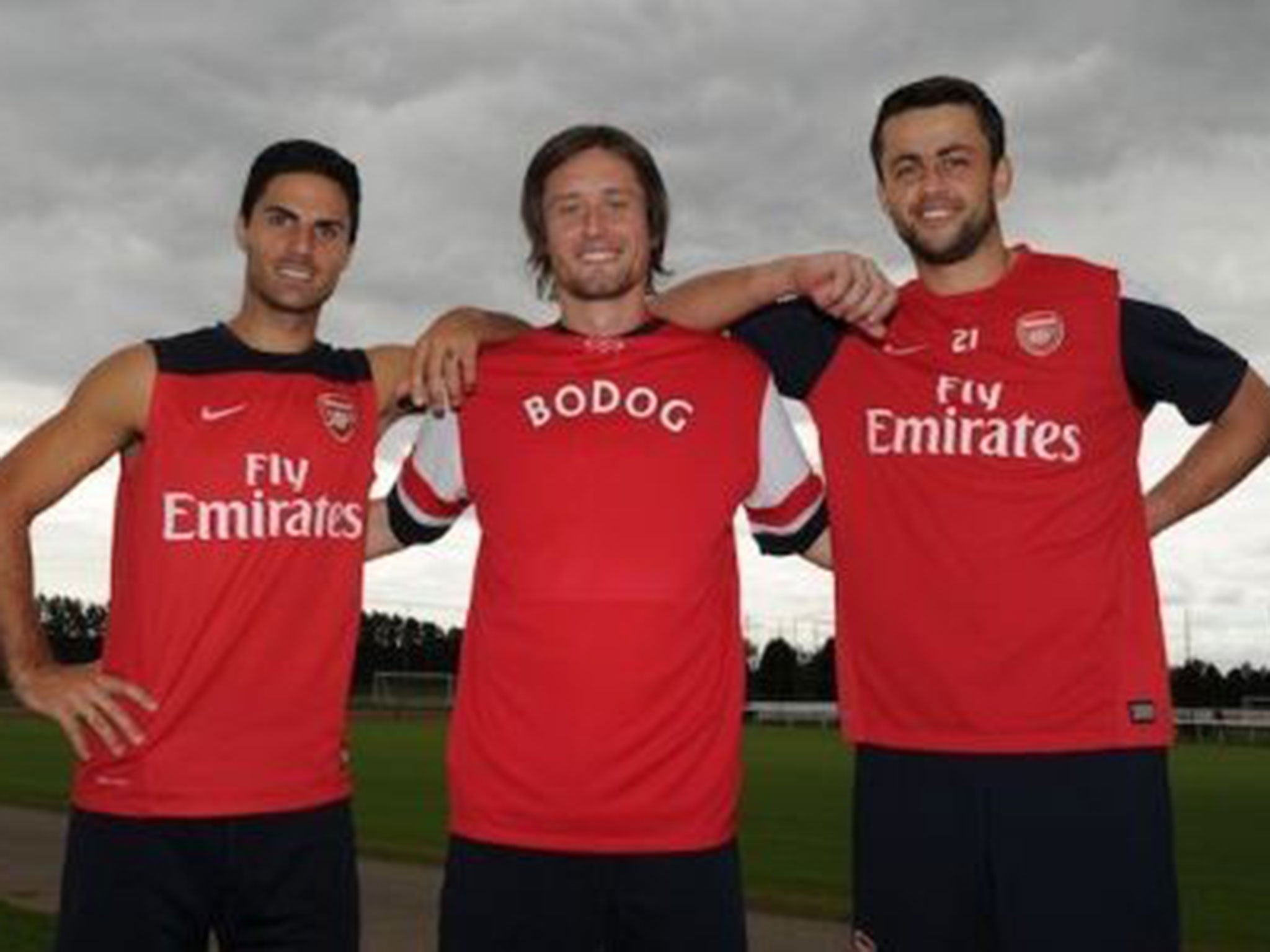Premier League clubs warned over ‘unlicensed’ overseas betting deals
Move could cost the Premier League as much as £90m a year

The national gambling regulator has warned the Football Association about the dangers of sponsorship deals between Premier League clubs and unlicensed overseas gambling firms, in a move that could cost the league as much as £90m a year in sponsorship revenue.
The warning from the Gambling Commission comes as it emerged that a three-year, “multimillion pound” deal between Arsenal and gambling firm Bodog may be called into question after it emerged the Canada-based firm did not have the licence to advertise to British gamblers.
According to the provisions of the Gambling Act 2014, which came into force at the beginning of the month, overseas gambling operators, who are often based in Asia, must have a licence with the Gambling Commission to sell into the British market.
Last August Bodog and Arsenal signed a deal to capitalise on the club’s growing popularity in Asia. Bodog says it does not advertise in the United Kingdom, but as part of the deal it was granted the rights to develop marketing initiatives with the club, generate content with its players and use its database of fans.
This has included a link to Bodog on the Arsenal website and Arsenal players, including Tomas Rosicky, posing in Bodog-emblazoned team shirts, as well as a promotional video for the gambling site on YouTube featuring Theo Walcott.
Although there is some uncertainty around the precise definition of advertising as defined by the Act, Arsenal claims it is confident its arrangements with Bodog are not in breach. The Gambling Commission does not comment on individual cases, but a spokesman urged all sports clubs working with overseas gambling operators to take legal advice to ensure they were not breaking the new law.
Separately, it has also emerged that the Canadian founder of Bodog, Calvin Ayre, is listed as “Most Wanted” by the Department of Homeland Security in the United States for allegedly running an illegal gambling business and money laundering. A spokesperson for Bodog said that Mr Ayre has “no part in the day-to-day running” of the company.
Arsenal, Chelsea, Liverpool and Everton are among clubs that have or have had lucrative sponsorship deals with online operators that take few bets from British punters, but benefit from the Premier League’s booming popularity in Asia.
Until recently many gambling operators, such as SBOBet and 188Bet, paid clubs for perimeter advertising at home matches, often displayed in Asian languages.
In a letter to sports governing bodies, the Gambling Commission, said: “We are aware that in some cases commercial partnership arrangements [which include sponsorship] are in place between sports clubs or bodies and remote gambling operators who do not hold a commission licence. Those operators cannot, in our view, advertise their betting services without both making it clear in the product as advertised and in reality that betting is not available to those in Britain.”
The body warned that clubs now risk prosecution if their sponsor failed to prevent gamblers in the UK accessing these sites or they were deemed to be failing in the “overall effort” to combat match-fixing through corrupt betting on “unlicensed operators in foreign markets”.
Bodog does block gamblers from the UK using its site. However, security experts warn that the use of so-called IP-blocking software could get around this.
Following the rule changes another major operator, SBOBet, which has previously sponsored Southampton, Swansea City, Hull, Norwich and West Ham United, was forced to exit the Premier League this year.
Adrian Parkinson, of the Campaign for Fairer Gambling, welcomed the crackdown. Parkinson said: “There isn’t an ideal solution to this, but ultimately we will see the departure of many recognised betting brands from the UK market and a slump in sponsorship revenue for those clubs most in need of it. That may be the price we have to pay in order to have a properly regulated betting market and one that provides adequate protection for gambling consumers.”
A spokesperson for Arsenal said the club was “fully aware” and “in full compliance with the Gambling Act 2014”, adding that Bodog is “within their partnership rights to post Arsenal content via YouTube”.
They added: “Bodog do not operate within the UK and the rights Bodog receive from Arsenal are specifically delivered outside Europe and are geotargeted appropriately. Bodog is not granted any advertising rights by Arsenal that contravene the Act.”
Bodog said that it did not advertise in the UK and had “ability to offer split stream advertising so that UK viewers will not even see adverts from Asian-facing companies.”
Join our commenting forum
Join thought-provoking conversations, follow other Independent readers and see their replies
Comments